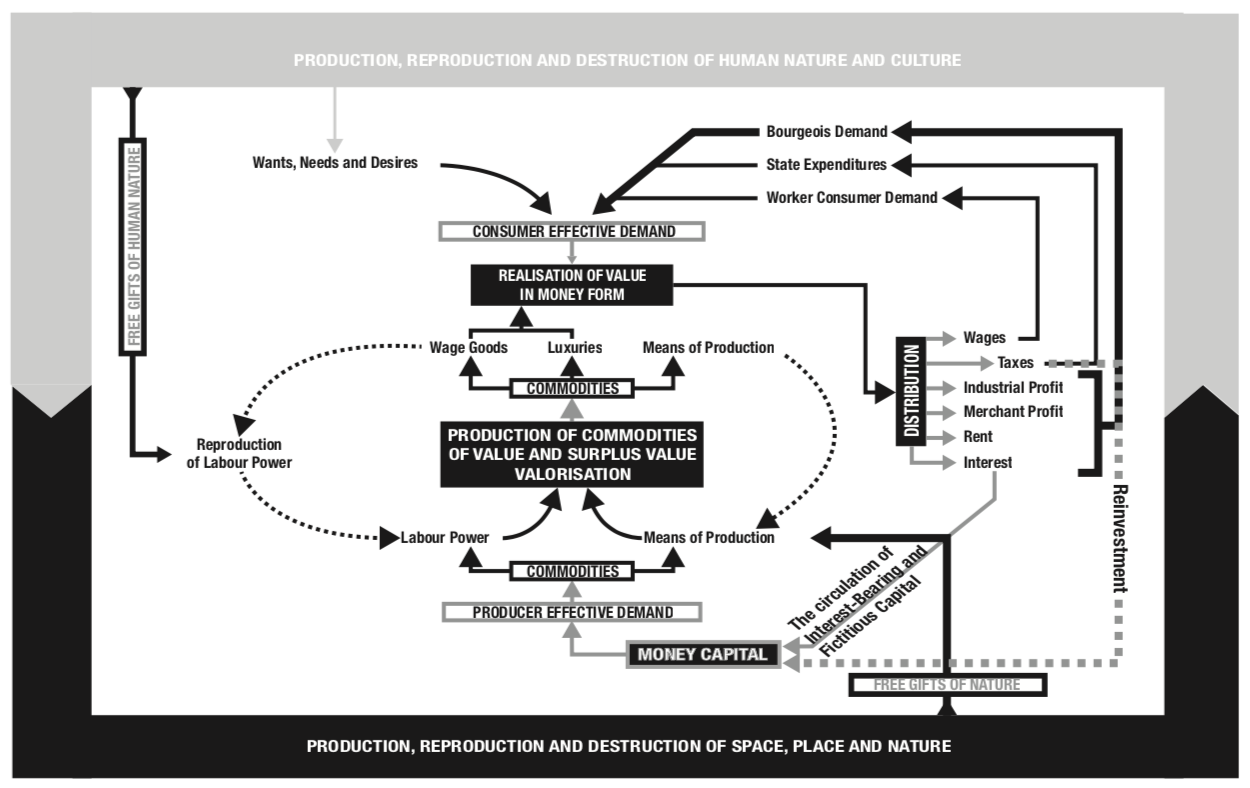Definition of social reproduction
Katz defined social reproduction as the “daily and long-term reproduction of the mode of production and the labor power that makes it work,” or as the “messy and fleshy” everyday occurrences and cultural forms that make a mode of production seem sensible and natural. She stressed that social reproduction is an ongoing practice, and one that has lead to considerable struggle throughout history. Specifically, questions of how much capital, the state, or the household should bear the costs of social reproduction have been central to the development of capital. Social reproduction itself is not revolutionary, Katz argues, because its function is to continue divisions and social structures. However, by recognizing its importance and dislodging the point of production from its privileged position in theorizing revolution, analyzing social reproduction opens up a wider field of possibility for political action. This type of theory has been overlooked by masculinist Marxists who often view the cultural forms that social reproduction produces as belonging to the “superstructure,” and ultimately as being determined by the mode of production in a unilateral way.
Geographies of social reproduction
Katz stressed that capital has always been global. What we need to think about when we discuss globalization is instead the increasing fluidity of production, compared to the relative fixity of labor. This process creates disparate labor pools with different social wages, pitted against each other, and exerting downward pressure on wages and benefits in the global north. Rather than naturalize this race to the bottom, Katz framed this apparent competition as a strategic project on the part of capital: capital creates the creations in both the north and south, simultaneously producing and preying on cheap labor. The ways this differentiation is naturalized and made common-sense — dividing the workforce along various lines and lubricating both exploitation and circulation — is a key part of the work of social reproduction. Transforming the sphere of social reproduction into a truly revolutionary arena means recognizing the nature and amount of work that goes on there. The role of nature in work becomes literal as Katz briefly touched upon our natural environment. While Marx’s spaces of inquiry typically revolved around the factory and machinery, Katz argues that the involvement of Marxist feminists created linkages between the role of labor in contending with questions of environmental justice.
Marxism, Feminism
A crucial early marxist feminist text that informs Katz’s analysis of social reproduction is Della Costa and James’s 1972 essay “Women and the Subversion of the Community.” Della Costa and James understand capital as necessarily destructive pre-capitalist forms of family, production, and community – this latter which they treat not as any group of people but as specifically communal (and now subverted) forms of being together. With the transformation of production, the role of social reproduction in the household is re-structured to serve “the production of that special kind of commodity, labour power.” And as long as revolutionary action is limited to the site of production and not social reproduction, they argue, those in charge of the latter – viz. housewives – will always be restricted to a supporting role. Della Costa and James challenge the women’s movement of the 1970s to resist a platform of integration into capitalist control and the double shift. “The role of housewife,” they argue, “behind whose isolation is hidden social labour, must be destroyed.”
Katz provided several examples of marxist feminist attempts to intervene in social reproduction. Drawing from Della Costa and James, Katz emphasized that withholding reproductive labor and redirecting it to communal efforts does not in itself stop the reproduction of a fragmented workforce. Similarly, things like the family wage may aid in accounting for the labor of social reproduction, but it banks on patriarchy for its effectiveness. Therefore, Katz asserted that things such as the wages for housework movement should be viewed as a stepping stone rather than endpoint of an anti-capitalist struggle.
Discussion questions
Katz discussed the recent US teachers strikes as responses to state disinvestment from education. How might we approach the importance of controlling social reproduction with the ongoing defunding and privatization of its institutions/primary channels?
Many of our previous discussions of anti-capitalist action revolved around actions that occurred outside of private spaces — through organized labor, regulatory practices, or alternative modalities in banking, etc. However, Katz notes that that …”the global and the intimate happen in the arena of social reproduction… it inheres in it the possibility of unmaking since it inheres in us, not outside.” What, then, are the possibilities of anti-capitalist action within the home, among the “messy and fleshy” contradictions of social reproduction?
We discussed withdrawing reproductive labor from the process of maintaining capitalism, and many of the examples were on a local and every day scale. What might global and long term anti-capitalist activity in the realm of reproduction look like?
Katz touched briefly upon the relationship of Marxist-feminism and our natural environment. How can we extend a feminist reading of Marxism into other fields of study, such as the science of climate change?
Further reading
Dalla Costa, Mariarosa, & James, Selma. (1972). Women and the Subversion of the Community. Bristol, UK: Falling Wall Press. [PDF]
Katz, Cindi. (2006). Messing with “the Project”. David Harvey: A critical reader, 234-246. [PDF]
Katz, Cindi. (2001). Vagabond capitalism and the necessity of social reproduction. Antipode, 33(4), 709-728. [PDF]
Katz, Cindi. (1996). Towards minor theory. Environment and Planning D: Society and Space, 14(4), 487-499. [PDF]
Pratt, Geraldine. (2004). Working feminism. Temple University Press.
Wright, Melissa. (2013). Disposable women and other myths of global capitalism. Routledge.


